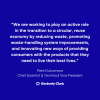SOURCE: Kimberly-Clark Corporation
DESCRIPTION:
Pete Dulcamara, Kimberly-Clark’s chief scientist and technical vice president, shares an update on progress made after one year of membership in World Wildlife Fund’s (WWF) Bioplastic Feedstock Alliance, and discusses how the company is continuing to drive meaningful change through its efforts to reduce plastic in its products and packaging.
Plastic pollution is a global problem with massive environmental impacts. According to a study undertaken by the World Economic Forum, the Ellen MacArthur Foundation and McKinsey & Company, an estimated 11 million metric tons of plastic enters our oceans each year – the equivalent of a dump truck per minute. If this trajectory continues, the study predicts that there will be more plastic in the ocean than fish by 2050.
These alarming trends are driving the growing demand from governments, NGOs and consumers for action to eliminate plastic waste. Achieving this objective requires a long-term strategy to reduce the use of traditional plastic in products and packaging, improve waste recovery and recycling methods, and develop alternative materials that are designed to be reusable, recyclable, and biodegradable.
As part of our 2030 ambition to improve the lives of 1 billion people around the globe with the smallest environmental footprint, Kimberly-Clark has made a commitment to reduce our use of new, fossil fuel-based plastics by 50% by the end of the decade. We are working internally and with our partners to move to more sustainable materials and processes. By 2025, we intend to make 100% of our packaging reusable, recyclable, or compostable. We have also set a target for 75% of the material in our products to be either biodegradable or recovered and recycled by 2030.
Over the past year, we continued to make progress and drive meaningful change through our efforts to reduce plastic in our products and packaging. As one example, our Huggies® brand in the U.K. removed 359 tons of plastic from its total wipes portfolio in 2020 as part of its Tiniest Footprint initiative. The Huggies team also introduced a new product called Huggies Natural Biodegradable, a new plastic-free wipe launching across Europe that is free of all fossil-fuel based materials.
Partnerships Play Key Role in Driving Change
We recognize that single-use plastics issues are complex, and solving for these challenges will take game-changing innovation as well as collaboration across industries, governments and NGOs. That’s why we’re partnering with biotech companies like RWDC to develop next-generation materials to replace traditional plastics derived from petroleum. Our partnership with RWDC brings together Kimberly-Clark's deep experience in nonwoven technologies and resin development with RDWC's innovative and cost-effective biopolymer solutions.
The collaboration will provide Kimberly-Clark with RWDC's polyhydroxyalkanoates (PHA) source material, SolonTM, to develop resins that are compostable and marine degradable. Should products or packaging made with PHA find their way into the environment, they biodegrade in soil, fresh water, and marine settings, preventing persistent plastics from accumulating in the environment.
Addressing the global challenges associated with single-use plastic is bigger than any single company. This is one of the primary reasons Kimberly-Clark joined World Wildlife Fund's (WWF) Bioplastic Feedstock Alliance (BFA) in 2020. The multi-stakeholder knowledge-sharing forum unites leading consumer goods companies with NGOs and academic thought leaders who are exploring biobased alternatives to traditional plastic.
Over the past year, BFA and its members have made significant progress advancing the role of biobased and biodegradable plastic in addressing global plastic pollution. Among recent projects, the Alliance has:
- Developed a position statement calling for science-based policy on plastics alternatives to aid in the transition towards a circular economy that maximizes the recovery and beneficial reuse of post-consumer waste.
- Updated its screening of potential feedstocks for responsibly sourced bioplastics.
- Built new connections with external experts to explore new work and current science involving biobased alternatives to traditional plastics, and participated in joint meetings with the Trash Free Seas Alliance and Resource: Plastic to discuss global plastic pollution, advanced recycling systems, and other topics.
Kimberly-Clark’s participation in the BFA builds on our membership in ReSource: Plastic, WWF’s activation hub to help companies double recycling rates, reduce unnecessary plastic, and shift to sustainable sources for the plastics they do need.
These initiatives underscore our commitment to innovation and waste reduction. While we don’t have all the answers, we are working to play an active role in the transition to a circular, reuse economy by reducing waste, promoting waste-handling system improvements, and innovating new ways of providing consumers with the products that they need to live their best lives.
KEYWORDS: NYSE: KMB, Kimberly Clark






